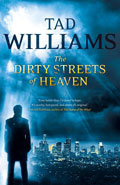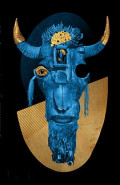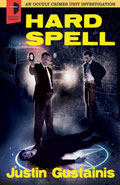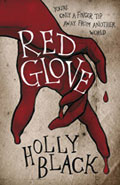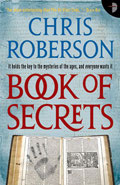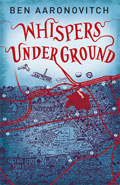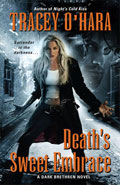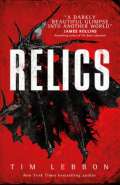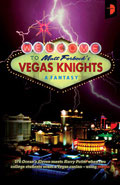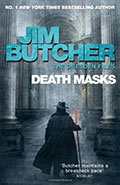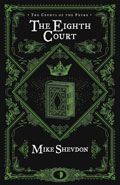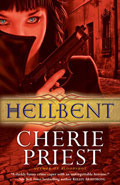The Janus Cycle
By Tej Turner
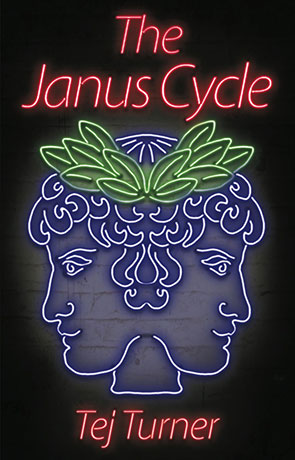
- The Janus Cycle
-
Author: Tej Turner
-
Publisher: Elsewhen Press
- ISBN: 9781908168467
- Published: April 2015
- Pages: 224
- Format reviewed: E Book
- Review date: 28/12/2015
- Language: English
- Age Range: N/A
Every now and then I am sent something that stretches the boundaries of my reading interest. The Janus Cycle is one such book.
Whilst this book is billed as a novel, it is really a collection of linked short stories. The linked theme follows a disparate group of individuals seemingly connected by their occasional frequenting of a nightclub known as Janus. These are urban fantasy/magic realism pieces that dial down the novums and focus instead on the human condition of each circumstance. There is a prevailing theme - that of not fitting in – and this is explored in a variety of contexts, with the magical levers only appearing at a key moment in each.
The title ‘Janus’ and its manifestation as a nightclub in the story is part of the author’s intention. Janus is a fairly well known two-faced Roman god of doorways and time. Turner uses the aspects of this mythology to bring character to the location, although it is not as clearly identifiable as a personified space as it might be, being fitfully used throughout the collection.
Instead our interest is guided towards the subjects of each story. The first, Friday, is somewhat aimless to begin with – a first person narrative exploring recreational drug use of two friends. Our viewpoint character Pikel chooses to indulge and this provides a vehicle for Turner to take us into a surreal and magical trip that establishes the time travelling powers of the character Frelia, who gets her own story later.
We move to The Christmas Puppy, a story about Tristan the artist, a young homosexual man in the first flush of a relationship with someone older. This is another first person tale, but has a much stronger flow to it. The characters are warm, real and endearing throughout the bittersweet narrative.
Next comes Bruises another drug trip where our unnamed narrator and his friend Pag get offered the red and blue pills. The Matrix reference is not lost on the uninitiated, although the choice of the viewpoint character is something of a divergence from the scene’s inspiration and the ensuing surrealism owes more to seventies psychedelia than anything else.
Red Rivers is a much clearer ghost and revenge story – a collection of women’s testimonies that howl in pain. Shadow Sisters also uses something ghostly and dreamlike, but becomes a tale of finding who you are and where you belong then standing up to peer bullying when you do. Throughout each of these tales we return to the Janus nightclub and see some of the peripheral characters of previous stories appear and disappear in the background.
Going Back is the aforementioned Freila story and it is here we begin to link together events. What begins as something of a strange relationship story changes quickly as our narrator discovers time travel and realises her mother, who has been locked in a psychiatric ward was telling the truth about her father’s similar abilities. This is a much darker and shorter visceral echo of the Time Traveller’s Wife but has a similar way in which it explores the real issues of people’s lives. Turner manages to link up a very small town British context with the essential plot pivot of the book.
The Dog Man continues the story of Tristan, but from the other side with Nigel, his older lover as the viewpoint narrator and by the end all the pieces are in place for the final story, Blisters which is truly magical and would not be possible without Turner’s careful work to put everything in place beforehand throughout the collection. To say anything about the destination you arrive at in this story would ruin the experience.
For a long time, Fantasy has walked in Science Fiction’s shadow, offering escapism but little attempt to tackle big questions. The Janus Cycle aims for some of those big issues – those of identity, belonging and conformity - and uses marginalised characters to demonstrate one of the better truths of humanity; that we’re all different, but also that we can all be the same. No matter what preferences you have in music, gender, sex, alcohol, narcotic, religion or anything else, there’s fundamental level on which we can respect one another and celebrate our differences together. The final story is a triumph against the building adversities of the collection without being a forced conclusion. You can read all the stories as individual narratives if you choose, but the last story really needs the others for you to appreciate its depth.
In Tej Turner we have a writer looking at modern society and using a little fantasy and magic to make us see it in a different light. It’ll be great to see where he takes us next.
Written on 28th December 2015 by Allen Stroud .
